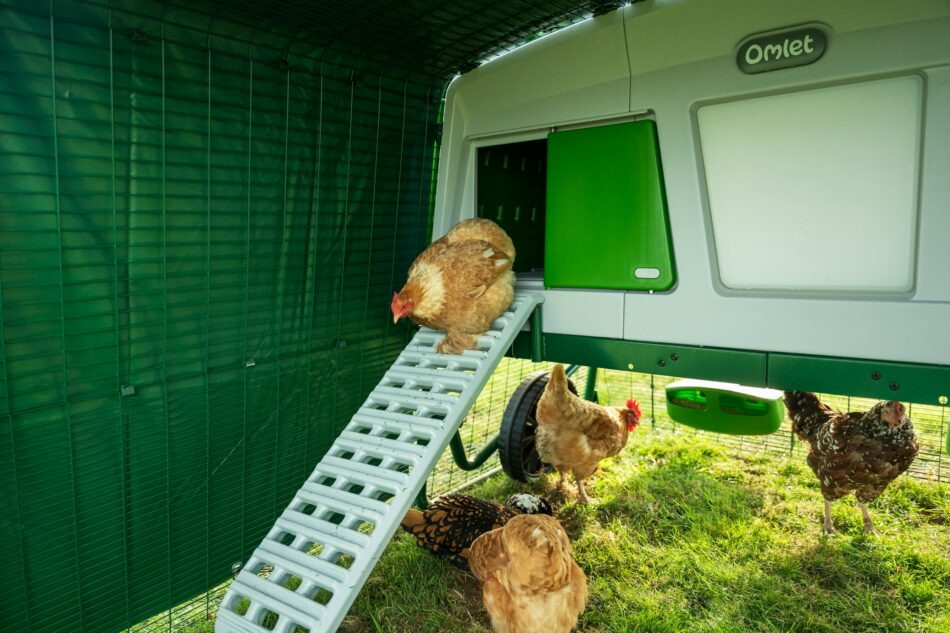Chicken sounds and their meanings
Hens are always talking amongst themselves. All those clucks and squawks mean something, and while some of the meanings of these chicken sounds are obvious – the explosive squawking of a bird running away in panic, for example – others are more subtle.
Here are ten ways in which you can eavesdrop on the chicken chat and brush up on the bantam banter.
Chicken sounds and what they mean
A calm, gently rising borrrrb
This is the chicken sound hens make as they peck their way through the grass or chicken run, and it means two things. It indicates that the chicken is enjoying the endless search for quick snacks, and it’s also telling the other birds ‘everything is fine’. A flock of hens saying borrrb together sends out the reassuring message that there’s nothing to worry about.
The cluck-cum-squawk
This brief, excited cry usually means that there has been some sort of confrontation, usually between a meek hen and a more dominant one who has muscled in to see what snacks the more timid bird has found. The sound is also used if a hen is surprised by something, such as the chicken-run door opening suddenly.
The ‘squawk bomb’
This is when the hen clucks, gobbles and squawks in one hysterical flurry. It sounds as if the bird is about to explode in a cloud of feathers. This is the chicken’s main alarm call, expressing fear and also telling the other birds to run. The causes can be vehicles, dogs, people trying to pick up the hen, or predators.
Cackling
This is the name often used for the familiar Buk-buk-buk-badaaak! call. Repeated several times, and loudly, it is the sound many hens produce after laying an egg. The hen moves away from the egg and then begins cackling. It is thought to be a way of luring potential predators away from the egg and the nest.
Buk-buk-buk (but with no badaaak!)
This slightly angry and persistent sound is often made by a hen who wants to sit in her favourite nest box but finds it occupied. It’s meaning is a combination of “I’m here!” and “Get out!”
Growling
If a hen is broody and doesn’t want to move from her nest box, she will make a hissing, growling sound. This simply means “Don’t touch!” and “Go away!”
Chick-chat
A hen hatching eggs will mutter various gentle clucking sounds to communicate with the chicks and reassure them. Once the chicks are hatched and running around, she tells them where the good scratching and pecking places are by saying tuk-tuk! (Cockerels use this sound too, to tell the hens that they have found a good foraging spot). Mother hens also have an insistent Rrrrrr call, which is the chicks’ cue to come running if the hen senses danger.
Crowing
This is cockerel territory, the classic cock-a-doodle-doo – although some hens get the crowing habit too. Crowing says several things. It means a new day has dawned, and it’s time to be up and scratching/pecking. It also tells the world that this is the cockerel’s territory, and that these hens are his. If there is more than one cockerel, the subordinate ones will only crow when the boss has crowed. Crowing usually hits 90 decibels, or even more!
Help!
A hen separated from the flock will make an alarm call. The sound is similar to the ‘cackling’ that announces a new egg. It is thought to be an SOS call to the cockerel to come and save his lost hen. There will be a strong element of danger if there are predators around, so it’s a risky strategy for a lost chicken.
Buzzing
First thing in the morning, with the chicken coop still locked, the hens will begin to make repetitive, buzzing clucks, which may rise in volume as the minutes pass and the doors remain shut. This sound simply means “Let us out – there’s lots of pecking and scratching to be done!”
With this knowledge of chicken chit-chat, you will be able to tell what your girls are talking about, even if you can’t actually see them. It’s an all-day, non-stop conversation!
Want to find out more about the wonderful world of chicken keeping? Take a look at the Omlet Chicken Guide for tips, tricks and advice! You can also visit the Omlet website to find everything you need for your flock including Chicken Coops, Walk in Chicken Runs, Chicken Fencing and more!
This entry was posted in Chickens

4 replies on “Chicken sounds and their meanings”
Interesting article. What about the high pitched squeals my hens make when a crow or similar flies overhead and calls? And the purring sound they make which I interpret as them being really happy?
I love the sounds the flock makes.
Mine have a specific familiar cat noise Duh-duh-duh-duh-duh-duh-duhhh
and another for pigeons or other big birds flying over sounds like Wooooooowwww.
Also what is that odd noise cockerels make, quite quiet and sounds like a balloon being very slowly deflated through a small hole?
I have only hens, no cockerels at the moment but my little pekin hen sometimes crows like a cockerel ! Wondered why she does that ?
Thank you, a really interesting article. I was really surprised to hear our Girls purr when settled comfortably in their house for the night. Also ours give a plaintive ‘wait for me’ squawk if separated from the other three.